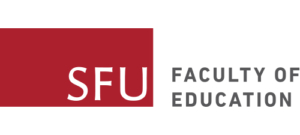EDUC 833-5 Social and Moral Philosophy in Education is a study of the ethical foundations of education. Areas in education where ethical questions arise are identified and elucidated, including the field of contemplative inquiry. We aim toward the application of contemplative ways of knowing, learning, and teaching in participants’ professional work and personal life. We focus on development of a learning community of practice, especially from contemplative theory perspectives and practice approaches.
There is inquiry into the nature of scholarship and critical thinking/engagement, especially from a contemplative orientation. There is inquiry into the nature of the contemporary world characterized by multiplicity and complexity of worldviews/paradigms, modus vivendi, and the associated challenges. As well, we inquire into the aims, scope, and possibilities of moral agency and examine models, tools and resources, including contemplative ones, for transformation of the moral self; there is investigation into how contemplative inquiry can serve ethically as a response to individual and social/societal needs.
EDUC 816-5 Developing Educational Programs and Practices for Diverse Educational Settings. We investigate theories and issues associated with developing educational programs and practices in various educational contexts. Addresses development of new programs and their implementation in schools and other educational settings. Effective educational programs are designed. In this course, we will explore how theory and research can contribute to the design of programs that are meaningful and promote transformative contemplative learning.
As this is a time of rapid civilizational change and upheaval, we might feel a moral activation to serve well. If we are designing educational programs, regardless of the setting or audience, how might we design and implement them to serve others well, to embrace and to offer the possibilities of what Aristotle referred to as eudaimonia (human flourishing)? This is the question that might motivate our collective inquiries during this course. All the classical contemplative traditions are inspired, motivated, and guided by a set of moral principles that aim to promote eudaimonia, happiness, well-being, enlightenment, peace and equanimity, kindness and compassion.
How might we design educational programs that are aligned with these moral goals and, as well, embody principles and practices that represent the best of educational theory and research?
EDUC 843-5 Embodiment & Curriculum Inquiry. We explore embodiment, the body as a site for knowledge, and its relationship to contemporary curriculum inquiry with specific emphasis on the area of performative and narrative inquiry and arts education. We explore philosophical, contemplative, and literary/poetic perspectives along a visceral perspective rooted in movement, dance, walking and physicality in a variety of forms, and even our limitations.
Particular attention will be given to the relationship between philosophies of the body and their relevance to us as researchers, educators, artists, and human beings. The mind-body dualism will be examined and its impact on how research is enacted, and how we enter the practice of teaching and reflect on our practice. The notion of “bodily attending” will be developed both for reflexivity, moving, writing, and pedagogy. A major question will concern how an informed understanding of embodiment can have pragmatic influence on the way we experience knowledge and articulate knowledge and its importance for bodily mindfulness.
EDUC 823-5 Curriculum & Instruction in an Individual Teaching Specialty. An examination of developments in a curriculum area selected by the student. The course will deal with major philosophical and historical factors that influence the present state and future directions of curriculum and instruction; we also explore the historical, cultural, and philosophical roots of the major worldviews; the various theoretical orientations to curriculum; the different positions regarding pedagogy; and other influences on our understandings of what contemplative practice is, the role of the contemplative, and our perspectives on contemplative education.
From within these various cultural and epistemological perspectives, we will focus on how cultural orientations to contemplative practice, and the role of the contemplative educator impact communities of practice and education. The students as contemplative/educators will be encouraged to bring together theory and practice as well as personal knowledge in relation to their own understandings of education, contemplation, and their particular contemplative practice. As teacher/researchers they will be encouraged to explore an in-depth arts-based inquiry within their teaching specialty and/or research interest.
EDUC 820-5 Current Issues in Curriculum & Pedagogy Focuses on educational theories and research, issues, trends and practices which impact teaching and learning in educational settings. As in all the courses, the instructors bring a contemplative perspective to the course material. We live in complicated times: increased connectivity, fragmentation, abundance, marginalization, violence, fear, the sacred, one world and divided worlds, threats, marvels, risks, hope, wonder! It is becoming apparent that education itself is subject to these new social, economic, political and cultural influences, pressures and realities and hence, even its purposes are being challenged.
This course is intended to recognize some of these realities and to explore and reflect on how contemplative practice may help us to align with educational values, curricular goals and pedagogical approaches that advance equity, social justice and the well-being of all. Grounding ourselves in such questions as ‘What is curriculum?’, ‘Who is it for?’, ‘What values does it represent?’ and ‘What will it accomplish?’, we will examine the social, cultural, political, and economic connections related to curriculum in our times. We will identify and explore key influences that shape contemporary practices, and consider issues such as the connections between curriculum and power, identity, knowledge, culture and language. We will also investigate the practice of selected pedagogical approaches in the light of shifting, and often competing discourses on learning and teaching.
Our work together will be informed by evolving understandings and experience of contemplative practice, both collective and individual, seeking to apply these practices to real world issues in the classroom and community. How may these curricular and pedagogical approaches be enhanced, enriched, and transformed, even, by contemplative practice? What contribution can contemplative education make to our multiple communities and their well-being?
EDUC 904-5 Fieldwork III EDUC 904 usually serves as the concluding course of this program. In that scheduling context, the inter-related aims of the course, the 4Cs, are to Consolidate (students’ cumulative understandings); Connect (students with each other, the guest speakers, the authors, and with themselves), Collaborate (students work together on areas of mutual scholarly interest), and Continue (extending and embedding the transformative effect of the program into students’ professional and personal lives beyond the program).
A fifth C will be added, namely, to Contemplate the diversity of contemplative practices and their potential role in students’ holistic growth, be that intellectual, professional, spiritual, emotional or cultural development, or in the subtle but dynamic fusion between these aspects of being human. This could include an elucidation of what the concept of “contemplative education” means to students at this point in their learning journey. Students may also choose to explore the relationships between conventional 3rd person, 1st person and 2nd person ways of knowing (objective, subjective and inter-subjective).
Students will also have an opportunity to further their understanding of major research methodologies and an opportunity to further develop their academic writing. Students will be expected to continue to document their lived experiences via their respective portfolios and will also engage in continued critical exploration of major educational ideas germane to the program.
All of this will be viewed through the contemplative pedagogical and philosophic lens that represents and reflects the program’s theoretical framework. This includes the ongoing development of students’ contemplative capacity, deepening students’ understanding of the pivotal relationship between objective, subjective and inter-subjective forms of learning, and continuing to cultivate the “container”, that is, a holistic, learning and development environment wherein relationships, intellectual curiosity, embodied knowledge and trust are highly honoured and consciously practiced.
EDUC 883-5 MEd Comprehensive Examination. One of the fundamental aims of our program is the cultivation of a learning community. We believe that the cohort structure provides the conditions for a “transformational cauldron” to develop and grow. This type of learning environment best facilitates what we hope to accomplish together, namely, our collective and individual holistic and contemplative growth. This includes growth in the intellectual, ethical, social, emotional, psychological, existential, embodied, and (for those who speak this language) “spiritual” dimensions.
During the entire program, students will create and develop a portfolio (digital and/or non-digital) that serves both as a reflective space and an opportunity to integrate their learning. The comprehensive examination consists of a presentation of that material for faculty and fellow students.
At the conclusion of MEd coursework, in the same semester that the last course is taking place, the cohort of MEd students host a capstone event as a community gathering, that is, a symposium, in which we practice intersubjectivity as we reflect, share, and celebrate our two-year learning journey. We boldly say in our program that “relationship is a teacher.” The course work is assessed the formal terminology of “Satisfactory/Unsatisfactory.” The grading is done by the participating faculty members. Additionally, fellow students and faculty provide oral feedback at the time of the presentation.

